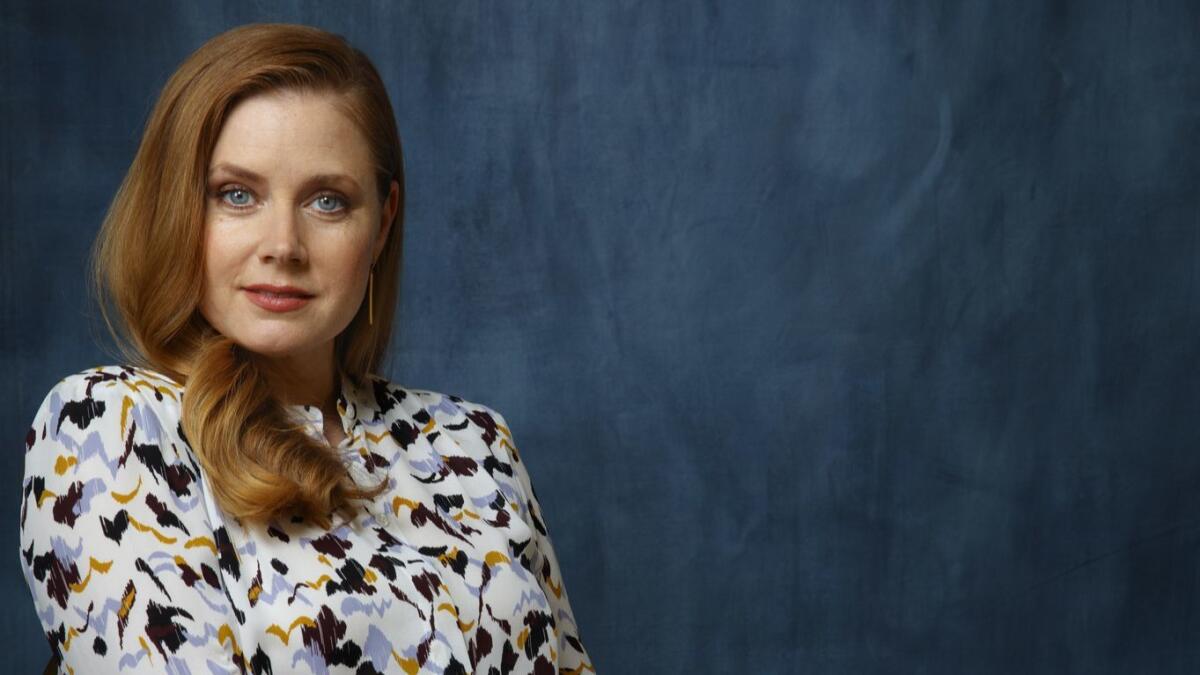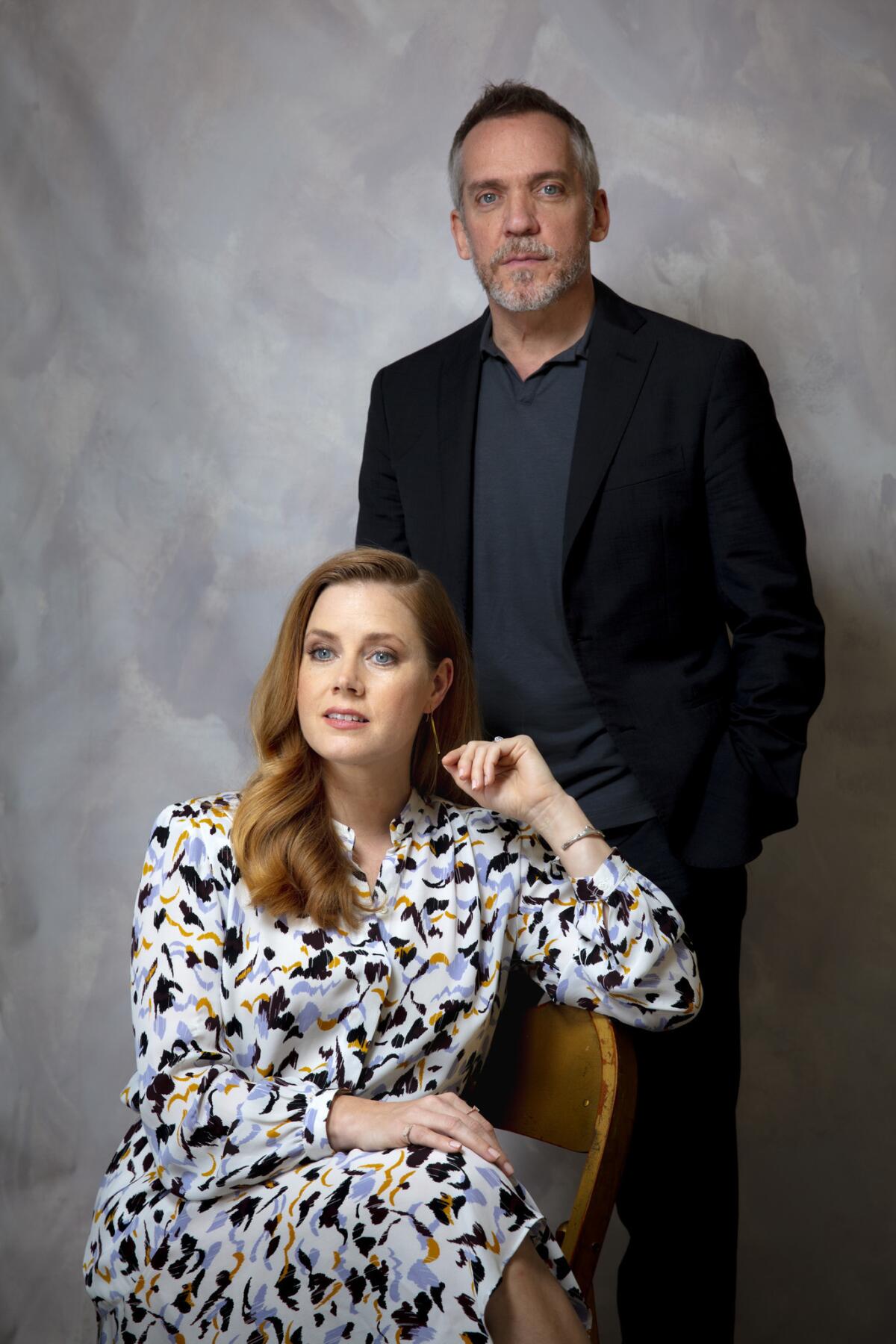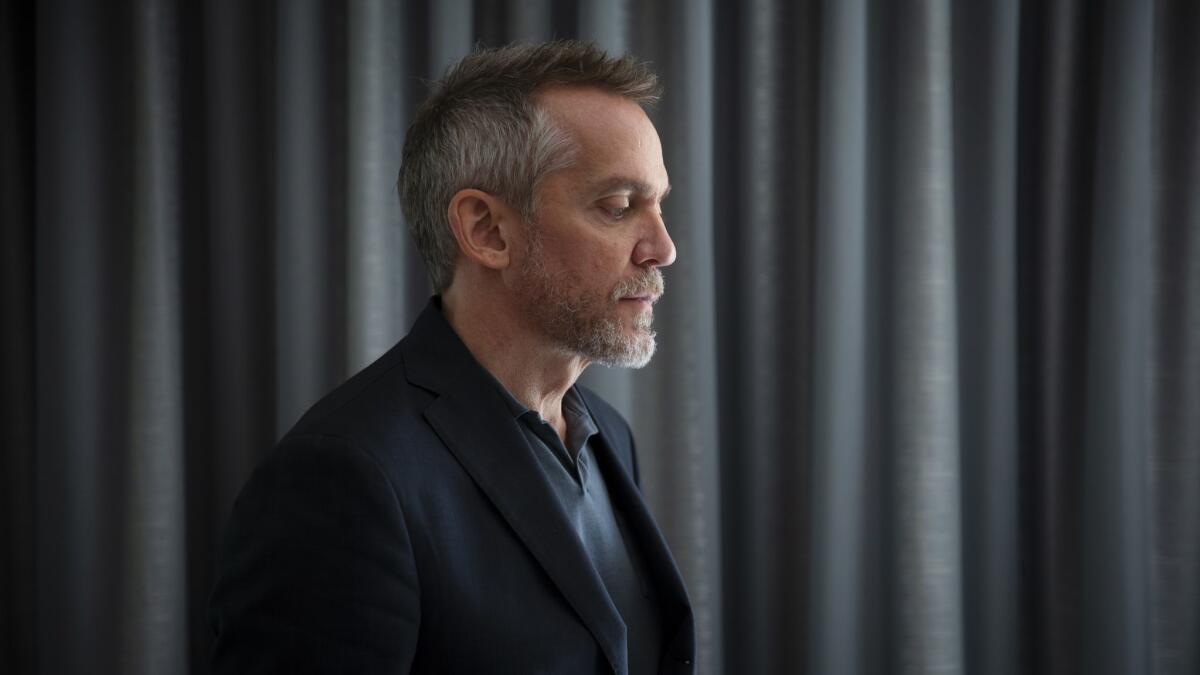‘Sharp Objects’ star Amy Adams and director Jean-Marc Vallée talk family dysfunction and rock to Led Zeppelin

- Share via
Get actress Amy Adams and director Jean-Marc Vallée into a room together and at some point Led Zeppelin might start blaring through the puny speakers of an iPhone, with Adams doing a subtle sing-along midway.
“We could keep this going,” Adams warns, as she bobs her head in time along with Vallée to the iconic band’s “What Is and What Should Never Be” inside a Beverly Hills hotel on a recent afternoon.
The musical moment is enough to make you wonder what could have been. The two were set to team up on a biopic of Janis Joplin, with Adams, a multi Oscar-nominee whose acclaimed work in films such as “Arrival,” “American Hustle,” “Nocturnal Animals” and “The Master” propelled her to the top ranks of Hollywood actresses, set to play the legendary ’60s rock singer.
That project was ultimately shelved. But music, ever so slightly, has finally united them in a different endeavor: HBO’s“Sharp Objects.”
Making its premiere July 8, the limited series is an adaption of the 2006 debut novel of the same name from author Gillian Flynn, whose other novels, “Gone Girl” and “Dark Places,” were made into feature films.
“Sharp Objects” is a psychological thriller that stars Adams as Camille Preaker, a troubled reporter with a penchant for drinking and cutting herself, who has been assigned to cover the mysterious murders of two young girls in her small Missouri hometown of Wind Gap. The journey to her fictional home also forces Camille to confront the corrosive effects of her psychologically abusive relationship with her mother, Adora, played by Patricia Clarkson.
It’s a series that’s been 12 years in the making — and, well, one that was originally poised to be a feature film. That is until Marti Noxon, the writer and producer behind “UnReal” and, currently, “Dietland,” persuaded the producers that had optioned the book that the only smart way to make this was for TV.
“I said, here’s who I am. This is a TV show, it’s not a movie,” Noxon recalled in a separate interview. “And [the producers] were like, “Well, we’re pretty far down the road to make it a movie. And I said, ‘I think you’re wrong’ until they eventually saw that I was right. … My argument really was that these kind of female characters are not successful in films and could get shoveled off to an indie — or it could be a studio movie where they try to make it ‘Less Sharp Objects.’ But for it to be as provoking and to build out some of the characters, it belonged on TV. You would have lost all that.”
Flynn characterizes the long journey from book to screen more simply: “The book was waiting for Amy.”
The eight-episode miniseries is directed entirely by Vallée, who won an Emmy for helming the first season of last year’s critically acclaimed “Big Little Lies.” And in keeping with Vallée’s reputation for preferring songs over score music to amplify emotions, “Sharp Objects” makes noticeable use of music, including Led Zeppelin (hence the jam session) — for reasons that will reveal themselves as the series plays out on the small screen.
In a long-ranging conversation, Adams and Vallée spoke about what drew them to “Sharp Objects,” their working relationship, and what might have been lost had it been a film.

Amy, what opportunity did you see in this character, in terms of expanding the types of portrayals we see of women on screen?
Adams: She just has such a deep pain. That’s something that I sense in people around me, I sense in myself — there’s a darkness or pain and it’s not something that we share openly. That’s what I’m always interested in exploring … this private experience of life. . Even if we don’t have similar vices in common with Camille, I think you can take away this idea of feeling alone or feeling unwanted or an alienation from family, which creates alienation itself. In the book, the line that got me, which always gets me, is her boss says — or she’s recalling something her boss said — and she says, “Curry always said I was a soft touch.” Outside of all of these really dramatic vices that she has, she’s a really tender heart and she cares. I find the most tender people are the most easily wounded and they end up with the biggest scars.
What did you bring out in each other in your respective roles?
Adams: I can be a very heady person. I like to think and I like to plan and I can be like precise. When you’re working in the way Jean-Marc works, it kind of takes you out of your head and puts you into a very visceral place. Exhaustion isn’t the right word but you just stop telling a story and start living the story.
Vallée: When she started to act, she’d use a tone down, and start to talk more [Vallée speaks softly to demonstrate]. The first day of shooting, I was like, “OK, that’s Camille’s voice she’s doing, hmm?” And I wasn’t sure about it. And you [Amy] just did it. You just went into this kind of talking where people have to listen — she’s a cerebral journalist, she has an obsession with words —
Adams: She also doesn’t want people to see her. You’re not gonna draw a lot of attention to yourself with volume. I didn’t know that you [Vallée] were like, “Oh, what is she doing with your voice?” You know, you’re not the first. I worked with ... I won’t tell you what director, but I worked with a director and I brought out the voice that I was doing and he literally went home and was like in full sweat until the next day, when he’s like, “Oh, no, no, no, yeah. It’s not Amy’s, she’s putting it on,” I’m sorry. You’re not the first to be freaked out. I didn’t know you were freaked out. That’s funny. I totally get it because we hadn’t had a conversation.
Vallée: But, to answer your question, what I learned and what I saw from Amy is that she had an understanding for who is Camille. I don’t really verbalize, and she does and she did, and I was receiving this every morning and it was putting me in a safe place.
The narrative touches on a lot of themes: the way your past can haunt you, the cycle of mental abuse, the way women treat each other.
Vallée: Yes, that history of abuse is what is heartbreaking — behind all the murder, the investigation [Camille] is doing — we want to discover what happened to Camille. And then, we get to understand the vicious cycle of abuse. And when you get to discover that’s why she’s cutting herself — this mother-daughter relationship that is so unique and so singular and so troubled. You’re supposed to feel protected and safe in your home with your mother, and you’re not.
Adams: That’s what’s interesting to me as well is this idea of generational violence between women, and it’s not something that’s been explored in this way, or at least that I’ve had the opportunity to explore. Every time I play something, I always do a lot of research, just to make sure if the story’s too out there, I’ve got to base it in reality and I always find so many stories or, by doing projects, people will approach me that I wouldn’t have expected to. I’ve shared some stories with a friend of mine about her relationship with her mother that I can’t even believe what I hear. And it just reminds me that these stories happen and there is this generational cycle that’s hard to break but important to break.
The book relies on narration to help bring in Camille’s internal perspective. The TV series does not.
Vallée: I read the script and I went “Oh, my God. There’s no voice-over in the script. This is what I love in the book’.’So I went to Gillian and Marti, what’s going on? Where’s the voice-over? I wanna hear her talk.
Adams: Camille is a very reactive character and it was hard for me to wrap my head around it too. She is reactive.
Vallée: Then of course they manage to get the quality of her internal voice into the scripts through dialogue and some details in her action. And we found a way, in the cutting room, to cut to quick flashbacks to get into her head. And this visual language becomes almost her voice-over because we see what she thinks of, how she thinks of, what she’s afraid of, what she fantasizes about. And words — in the editing room, we added words in the reality from [Camille’s] perspective, but when it’s from someone else’s perspective the words are not there. Like, you’ll notice the word “dirty” scrawled on the trunk, like someone wrote “dirty.”
Adams: That’s amazing. That’s so smart because so much of Camille being obsessed with words is her claiming reality, her understanding that there’s something that she knows, trying to hang on to truth, and she puts it on her body as a memory. So yes, it’s cutting but it’s also claiming the truth, claiming the moment because Adora has so systemically created this insanity inside of her where she no longer trusts anything.
Amy, this is your first time serving as an executive producer on a project. What was the experience like? Do you want to do more of it?
Adams: I think it’s something I want to head towards. I’d be curious to try it again if I had more of a supporting role because I really do like to be active. But as a producer, I think people trusted that I actually wanted to make the day shorter and make us all more comfortable, you know what I mean? I’m not sure that I’ve ever felt comfortable using my voice in that way. Like trying to, believing that people would trust that I was doing things for the betterment of the whole and not just of myself. I think that’s something that I really enjoyed and also getting into all parts of the project. It was intense. There was a lot of things that I loved about it.

“Sharp Objects” was optioned to be a film before it became the TV series. What do you think might’ve gotten lost or not fully explored had that happened?
Adams: I think Wind Gap as a character would’ve been lost. All of the smaller characters might have been repressed a little bit. And I think they’re so informative to how those structures stay into place, how everything kind of keeps as is.
Vallée: In two hours, the character-driven stuff, the emotional stuff would’ve been hurt … and suffered.
More to Read
The complete guide to home viewing
Get Screen Gab for everything about the TV shows and streaming movies everyone’s talking about.
You may occasionally receive promotional content from the Los Angeles Times.







